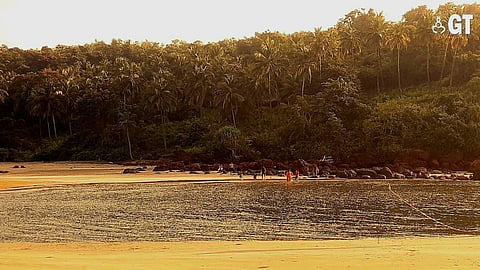

Having finished drawing a huge turtle on the sands of Galgibaga Beach in Canacona, Marylou from the United Kingdom writes “Turtle Beach” over it and after stretching out, relaxes by its side.
It is early evening and the locals start making their presence felt on the beach. The Galgibaga Beach is paradise to the tourists residing in the 50-odd beach huts, from where one gets a picturesque sight of the sea, sun and sand.
Galgibaga Beach in South Goa, unlike many others in Goa, is different because here one can truly experience nature – no noise, good food and clean residences managed by the locals.
“I have two rooms available for today and tomorrow. Each room costs Rs 2,000,” says Sunita as she serves a hot cup of masala tea along with a toasted cheese and chicken sandwich.
Galgibaga, for the tourists, is a dream reality far away from crowded Palolem and other beaches along the Canacona coast. The crowd consists of the old and young from India and abroad, all looking to absorb the essence of the Goa of the past.
“One cannot describe the feeling of being here. When I first came to Goa, I stayed in Anjuna. That was many, many years back. It’s a hub of noise pollution now. But that old tranquility I discovered here,” observes Sue, as she starts her evening walk with her friend.
Since the beach has been declared a turtle nesting site, activity is minimum with guests and locals enjoying the raw splendour. The sand is clean, the water looks transparent and being on the beach is an experience unlike any other.
On the extreme end of the beach, sea water kisses the river which swathes past the hill. The topography of this place is unique – sand, rocks and water give Galgibaga a distinct edge over others.
There is just one store before one nears the beach, and parking space is available 200 metres from the shoreline, watched by diligent turtle guards.
Despite parking at the beach being a no-no, the beach hosts plenty of visitors in the evening with children and locals waiting for the sun to set. There is just one store before one nears the beach, and parking space is available 200 metres from the shoreline, watched by diligent turtle guards.
“This is the time of the year for turtles to come ashore to lay their eggs, and hence we see that the noise is minimal after sunset,” says a guard. “We hardly have any problems as most visitors know the game,” he adds.
Sunita, who runs a restaurant and seven beach huts along with her husband, has a cheerful smile as she serves guests. The restaurant, managed by her family, offers Goan, continental and Chinese food.
Start your meal with a cheese and chicken sandwich and one will get the taste of what one can expect thereafter. The food is tasty, prepared hygienically and reasonably priced.
“We have foreigners and people from India coming to stay here. Some stay for long, whilst others come to spend a week or so. Most of our guests are regulars from abroad,” discloses Sunita, as she does the cooking and serving along with her husband, and her mother-in-law looking over.
As the sun begins to set, the festive celebration in the church next to the beach ends, and people start swarming out, surprising the visitors on the beach because even there the sound is minimal.
In many ways, Galgibaga Beach seems to have been saved by it being declared a turtle nesting site.